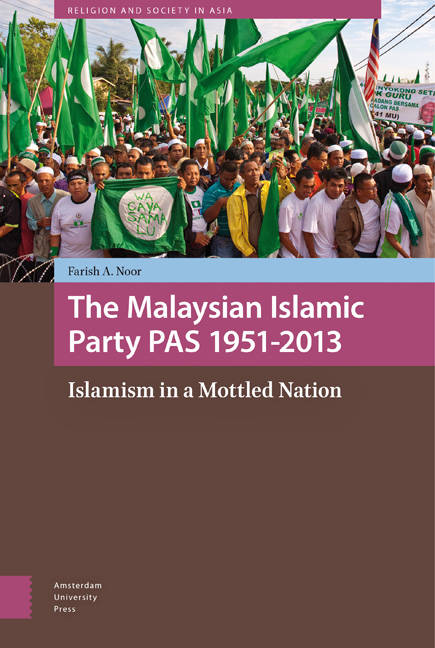Book contents
- Frontmatter
- Dedication
- Contents
- Introduction: Islamism in a Mottled Nation: The Story of PAS
- 1 1951-1969: The Orphan of the Cold War: An Islamic Party Steps on the Stage of Malaysian Politics
- 2 From Internationalism to Communitarianism: PAS as the Defender of Malay Rights: 1970-1982
- 3 PAS in the Global Islamist Wave: 1982-1999
- 4 The Jihad of the Ballot Box: PAS’s Democratic Experiment: 2000-2013
- 5 Religion, Politics, Islam, Islamism: What PAS Is, and What It Is Not
- Bibliography
- Index
1 - 1951-1969: The Orphan of the Cold War: An Islamic Party Steps on the Stage of Malaysian Politics
Published online by Cambridge University Press: 12 February 2021
- Frontmatter
- Dedication
- Contents
- Introduction: Islamism in a Mottled Nation: The Story of PAS
- 1 1951-1969: The Orphan of the Cold War: An Islamic Party Steps on the Stage of Malaysian Politics
- 2 From Internationalism to Communitarianism: PAS as the Defender of Malay Rights: 1970-1982
- 3 PAS in the Global Islamist Wave: 1982-1999
- 4 The Jihad of the Ballot Box: PAS’s Democratic Experiment: 2000-2013
- 5 Religion, Politics, Islam, Islamism: What PAS Is, and What It Is Not
- Bibliography
- Index
Summary
When PAS was born, it emerged into a world where not all around it were happy with its coming. From its early days it was brought up in an environment where it felt life's harshest blows. That was PAS, as it took its first steps when this country approached its independence …
Bachtiar Djamily, Kenapa PAS Boleh Jadi PAS?Islamism Ascending: How and Why Political Islam Emerged in the World of Malayan Politics
That the Pan-Malaysian Islamic Party, or PAS, would develop into the biggest and strongest opposition party in postcolonial Malaysia was neither a fact that was predetermined nor necessary, though it happens to be a reality today. How this happened is the subject of this book, and in the course of charting PAS's complex and convoluted story, I chart the history of Malaysia as well.
Much has already been written about the arrival of Islam to what would later be called the nation-state of Malaysia, and many authors have dwelled on the theme of Islamisation as it developed over the course of several centuries. By the time that Southeast Asia experienced the impact of colonial-capitalism in the 18th century, there were already native polities that were Malay-Muslim in character, and where Islam had furnished the indigenous populations of the region with their own vocabularies and epistemologies of power, authority and governance. That the native polities of both mainland and maritime Southeast Asia were already sovereign states with their own understandings of authority and territoriality did not, however, forestall the spirit of imperial adventurism that propelled the Western powers eastwards, and by the 19thcentury almost every Southeast Asian kingdom had come under the sway of the British, Dutch, French, Spanish and, finally, the Americans.
In time, the native communities of Southeast Asia rose up against the Western colonial powers, and their resistance was often couched in terms of a local vocabulary of rights and entitlements, with ideas borrowed from the repertoire of the natives’ religions: In British Burma, Burmese nationalism developed in tandem with politicised Buddhism; in the same way that Indian nationalism also found some inspiration in the discourse of Hinduism, among others.
- Type
- Chapter
- Information
- The Malaysian Islamic Party 1951-2013Islamism in a Mottled Nation, pp. 17 - 66Publisher: Amsterdam University PressPrint publication year: 2014



